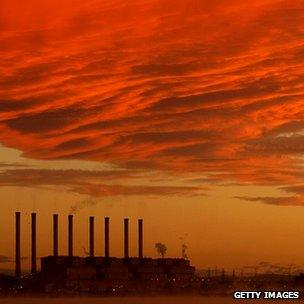Fossil fuels: Stubborn to substitution
- Published
- comments

Energy supply may create demand, and vice versa
A cautionary tale emerged earlier this week for anyone who advocates investment in low-carbon energy power as a way to curb climate change.
It's obviously a pretty widely-used strategy, with governments from Europe to the Middle East to Asia and Australia investing in nuclear reactors, wind turbines, biofuel plantations, solar panels and so on.
The grand plan, of course, is that they will gradually supplant the coal and gas-fired powers stations, the oil-fuelled cars and the gas-heated homes. But will they?
Richard York from the University of Oregon, US, external, whose studies focus on the social dimensions of climate change, decided to examine this replacement issue empirically and see if it actually happens.
His conclusion is that it largely doesn't.
The paper he's published in Nature Climate Change, external this week used data from the World Bank and other data sources to look first of all at electricity on its own, and then at all energy.
Not every country has compiled the data; but most have, and some records date back 50 years or more.
Depending on the precise way he cut the analysis, he found that each unit of low-carbon energy coming into the economy displaces at the most about a quarter as much fossil-fuel energy - and at the least, just 1/13th.
In other words, if a government wants to replace the electricity generated by a one gigawatt (GW) coal-fired power station, it would have to supply 13GW from new nuclear or renewable installations.
As a sidebar, as we're talking about actual energy here rather than installed capacity, the implication for the scale of renewables needed with their intermittent generation is much higher.
It seems counter-intuitive. So what's going on?
"Often the misunderstanding is that demand is kind of 'out there' and exogenous, and supply is created to meet demand - but in some ways I think supply creates demand," Dr York told me.
"The rise of the giant sports utility vehicle is an example of how energy gets siphoned off when we make it too available. [And] the rise in bigger houses, in America we can them McMansions. So you add energy, it makes it more available, and leads to a lot less conservation as it trickles through the economic processes."
In other words, whatever energy is there will be used.

Instead of more and more alternatives to coal, it may be more effective to suppress coal use
It's important to note that the equation for developing countries may be very different.
Here, renewables may be replacing nothing - they're often new capacity, especially in rural areas with no electricity connection to the grid, and make a meaningful contribution to development.
However, it's developed nations that are supposed to make the first cuts in fossil fuel emissions, according to what they've agreed under the UN climate convention, external, so it's here that any lessons should really apply.
So what is the lesson?
"There's this common view that if we just increase alternative energy development, that will naturally filter through the economy and displace fossil fuels," said Richard York.
"I think what it says is that we need actively to suppress fossil fuels if we want to remove them, [using] something like a carbon tax - and to the extent that we subtract fossil fuels, that creates the incentive to foster alternatives."
The prescription is already being followed in a number of countries that have carbon taxes or trading schemes. But what the research suggests is that governments would decarbonise faster if they paid more attention to curbing fossil fuel use and less to stimulating alternatives.
However, there's a big political price for that - and in the short term, an economic price as well.
In recessionary times, it would mean making energy more expensive. Unpopular, and damaging to attempts to rebuild from the downturn.
Nevertheless, it does appear to confirm what others have suggested before; that curbing the supply of carbon-producing fuels into the economy is ultimately the best way to curb emissions.
You can't burn what you don't have.